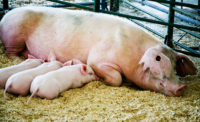Supreme Court to weigh in on California downer law

Arguments in the U.S. Supreme Court over Califoria's livestock downer law are set to begin on Nov. 9. At issue is whether California has the authority to ban the slaughter of animals too sick or hurt to stand., reports the Press-Enterprise.
The law was passed in 2008 and barred California's meat packers and slaughterhouses from selling, buying, butchering or holding non-ambulatory animals. The law was prompted by the Westland/Hallmark animal abuse case, where beatings of downer cattle by company employees were secretly videotaped. At the time, most downer cattle were rejected from the food supply, but they could still be slaughtered for beef after approval from a federal veterinary inspector.
President Obama later announced new rules that prohibited downer cattle from being slaughtered under any circumstances. California's state law spread that rule to all other species. The National Meat Association is among the industry associations that have taken issue with California's law, stating that the state law is pre-empted by federal law that that some animals, particularly hogs, should be exempt from the ban.
“While sick animals of any species are not allowed into the food supply, to make a determination that a pig … is ambulatory — solely based on if it wants to get up — is not taking into account the characteristics of a species,” National Meat Association spokesman Jeremy Russell said. “It just might be tired, or cranky.”
The downer animals would have to be euthanized, adding a cost to the packer. Attorney Steven Wells, who is arguing the case on behalf of the industry, says that as many as 2.5 percent of the anumals would have to be euthanized under the law.
“There’s a significant financial impact,” he says.
Deputy Attorney General Susan Smith, who will argue the case for the state, said categorically excluding downer animals from the food chain — in the same way dogs, cats and horses cannot be slaughtered for meat — doesn’t impinge on the activities within slaughterhouses.
“Our fight is really defending the state law and saying it is constitutional,” Smith said. “We think a state should be able to decide if it doesn’t want to eat certain types of animals.”
Source: The Press-Enterprise
Looking for a reprint of this article?
From high-res PDFs to custom plaques, order your copy today!







